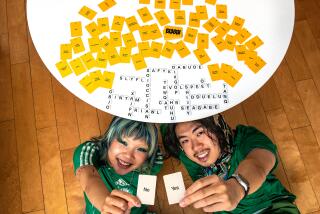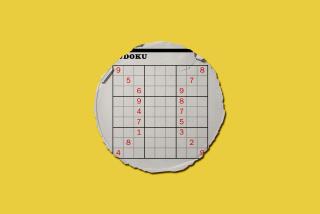What’s a 9-Letter Word for an Unusual College Course? Crossword
- Share via
Edward Julius loves to double-cross his college students, who suffer from gridlock that isn’t caused by their evening commute to class.
Students who take his “Crossword Construction for Fun and Profit” are frustrated but intrigued by their latest homework assignment--to complete a symmetrical grid of 11 squares per side using correctly interlocking crosswords.
The rare course on strategies of professional puzzle makers is being taught on five Wednesdays through the end of this month at California Lutheran University by Julius, a business professor who is known among puzzlers for the innovations he has brought to the craft.
The Cal Lutheran course is “certainly a novelty whether it’s here or on the East Coast,” says Stan Newman, who edits New York Newsday’s Sunday puzzle and taught a similar course last year at Hofstra University on Long Island. He credits Julius with “making the crossword puzzle appeal to people under age 40.”
Most activity in the puzzle world--from tournaments to crossword societies--takes place in New York. The editor of the San Francisco Examiner’s Sunday puzzle, Merl Reagle, adds, “As far as I know, Ed’s course is the only one this side of the Mississippi.”
“His puzzles are fresh and innovative. They bring crosswords into the 1990s, using language that people know, but that doesn’t make them easy,” says Will Shortz, editor of Games magazine. He says Julius’ “New Wave” puzzles use verbal tricks, puns, modern trivia, popular culture, movies, TV shows, and songs, and rely less on traditional opera and mythology.
Julius, who began constructing puzzles 30 years ago when he was 7, last offered the one-unit course in 1982, and he says he’ll probably offer it again next January.
“Everybody laughed about the class. They respect it now because they realize it’s difficult and challenging,” says Claudine Mullenaux, 21, a junior from Pacific Palisades and one of 15 students in the class. An education major, she plans to use her new skills to develop a creative third-grade curriculum.
“Theme puzzles would be good to reinforce spelling words or vocabulary in a science unit,” she says, adding that she believes the puzzles could develop “higher-level thinking” that involves evaluation, not just simple recognition.
Barb Smith, 46, a mother of five from Camarillo who is also preparing to be a teacher, says, “My 19-year-old helped me with last week’s homework.” She looks forward to the session on writing “dull vs. dynamic clues,” and has gained more appreciation for the human mind. “Even if a computer could generate a puzzle, it would be sterile and unimaginative.”
Manual Alvarez, 21, had not worked with crossword puzzles until last semester when they were assigned as homework in his beginning public speaking class. Alvarez, who speaks Spanish at home, says his English has been enriched by the assignments.
Martha and Walter Gutman took the course together eight years ago. The avid crossword fans never use dictionaries to solve them. “We only do them in ink. I correct my puzzles later in red ink so I keep on learning,” says Martha Gutman, 61, a faculty secretary.
Her husband, also 61, formerly an accountant and vice president of Macmillan Publishing, taught his own course a year later at The Learning Tree University in Thousand Oaks. He most enjoyed, “seeing people who had been trying for years without success to solve and construct puzzles, improve to the point of making one or two a week.”
Julius’ puzzling career began when he was a sophomore at Rutgers College in 1972, when he devised a puzzle for college papers. He still syndicates weekly puzzles today to about 100 colleges. It takes him up to 15 hours to prepare a college grid, but he’ll spend up to 50 hours concocting a Sunday New York Times puzzle, which he sells occasionally--he says the time spent isn’t worth the effort. He has written six Bantam crossword books in addition to several best-selling study guides in accounting.
Each of the Cal Lutheran sessions lasts three hours. Students begin with warm-up mental exercises including anagrams, palindromes, and fill-in letters. They become familiar with reference works and tools used by professionals, as well as how to market crosswords.
“A knowledge of American English is very important,” Reagle says. During his guest lecture on “The Puzz Biz,” Reagle discussed the history and evolution of crosswords and advocated consistency in selecting words to construct a “Theme” puzzle.
Students also learn to analyze the best positions and sequence for placing vowels and consonants to achieve a successful interlock. “Be fair. If you construct an obscure word, be sure to use easy crossing words so that every letter can be reasonably solved,” warns Julius, who doesn’t like to solve puzzles--he says he isn’t good at it.
“I solve one puzzle a year if you round up,” Julius says.


